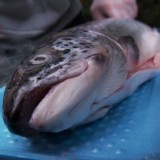Anyone who has been following the sorry saga of inexplicable diseases and unusual mortality in BC’s wild salmon will not be surprised that the information in Twyla Roscovich’s documentary, Salmon Confidential, links the source of this trouble to the salmon farming industry. The surprise, however, is the impact of such information when its complexity is condensed to an intense 70 minutes.
The documentary, of course, is guided by its own perspective. But this perspective is supported by such compelling and powerful circumstantial evidence that it incriminates the salmon farming industry and the government agencies so obviously accommodating and protecting it. If the health of wild salmon are at risk, these are prime suspects.
Twyla Roscovich, with her keen filming and editing skills, presents a convincing case. But the highest accolades go to Alexandra Morton, the indefatigable BC biologist whose worries about the safety of wild salmon and the entire ecology they support have become her life’s concern. Her research and investigations have brought the public’s attention to the alien diseases threatening native Pacific salmon. It was ostensibly her work that resulted in the reconvening of the Cohen Commission to hear new evidence on previously undisclosed viral infections in wild fish. This testimony subsequently led to the incriminating recommendations in Justice Cohen’s Report, which clearly question the environmental safety of salmon farms.
Morton’s evidence linking salmon farms to diseases in wild salmon has now initiated “the world’s largest study of salmon health” headed by the genetics expert, Dr. Kristi Miller, the same researcher who refused to be silenced by the ministerial pressures of the Department of Fisheries and Oceans where she is still employed. This 5-year study, involving DFO, Genome BC and the Pacific Salmon Foundation will use state-of-the-art technology developed by Dr. Miller to examine salmon diseases from farmed, hatchery and wild sources.
Yet another consequence of Morton’s heroic efforts, belatedly announced on March 23rd by the BC government, is a moratorium until 2020 on any further expansion of salmon farms in the Discovery Islands area, that narrow cluster of passages where many wild fish are compelled to migrate on their journey from and back to their nascent rivers.
This situation, the film contends, is a death trap. One of the most searing images in Salmon Confidential is of a single surviving salmon swimming upstream past the white corpses of thousands of dead and unspawned fish. Something alien, unusual and traumatic is happening to BC’s wild salmon, testament to an unfolding ecological tragedy. Norway has confronted this same problem by banning salmon farms from the migration routes of wild fish. Why then, according to evidence given by one DFO official at the Cohen Commission’s reconvened hearings, has no such application ever been refused on BC’s coast?
A memorable and revealing moment occurs in Salmon Confidential when Dr. Kristi Miller testifies that DFO warned her not to do any testing if she didn’t know what the ramifications would be. In other words, this government agency has an unofficial agenda that could be compromised by an inconvenient scientific discovery. Placing ignorance ahead of knowledge is the perfect formula for environmental catastrophe.
The Canadian Food Inspection Agency, the CFIA, seems to have a similar unofficial agenda. Infectious salmon anemia is designated a reportable disease of global health concern. If the CFIA should find ISA in BC farmed salmon, international protocol would require that all exports stop. So the solution to this problem, according to Salmon Confidential, is to not find the disease. The documentary explores the complex ends to which the CFIA has gone in order to hide evidence — complete with a threatened government Bill 37 (2012) that would forbid any individual from revealing the existence of such diseases as ISA. The reality is that at least two other new diseases in wild salmon, piscine reovirus and salmon alphavirus, have also been linked to salmon farms.
Despite the serious tone of Salmon Confidential, the documentary does have moments of levity. When salmon farmers refused to give Morton any samples of their fish for testing, she and her fellow investigators found an ingenious solution. They simply bought farmed salmon from a local supermarket — of the 11 fish carefully dated and identified with the name of the grower, 3 tested positive for ISA. And when Morton decided that testing dying fish from a salmon farm would be the definitive evidence, she was even denied “mortes”. As the researchers plotted how to surreptitiously recover a sample, an eagle picked up one of the carcasses and unceremoniously delivered some crucially important body parts to a nearby rock.
But Salmon Confidential is much more serious than it is entertaining. For anyone who cares about the future of wild salmon in British Columbia, this is a film that must be seen. It identifies Twyla Roscovich as a skilled documentarian and places Alexandra Morton in the pantheon of heroic environmentalists — not to mention a competent scientist and a gifted detective. Both these women have the insight, perseverance and fortitude to help save BC’s ecological future as they shake the edifice of deception and duplicity that they characterize as the history of salmon farming in British Columbia.
By coincidence, Salmon Confidential was finished in time for the upcoming provincial election in May. Both Roscovich and Morton hope its timely arrival makes the protection of wild salmon a part of the political conversation. Indeed it should, given the crucial importance of these iconic fish to BC’s identity and ecology. The film is now touring the province and will be shown around the province over the next several months. See showing details here.

